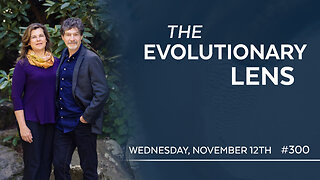Premium Only Content

Jewelry and precious gems with a clear conscience | DW Documentary
Guilt-free precious gems — when it comes to jewelry, more and more people are checking the sustainability credentials. Environmentally friendly pearl cultivation and synthetic lab diamonds are helping make this possible — and minimizing harm to humans and the natural world.
For a long time, no one gave any thought to the ecological impact of jewelry. The river pearls used to adorn crowns were often taken from huge mussel beds in German rivers and streams. The species is now endangered and nature conservationist Wolfgang Degelmann is working to save it. "The mussel can look back on a 230-million-year history, when the conditions for it to thrive were just right. Then humans come along and after 100 years, that 230-million-year history was trampled underfoot." Degelmann runs a mussel breeding program with the aim of reintroducing the creature to its natural habitat.
In the Fiji Islands off the coast of Savusavu, Justin Hunter runs a sustainable pearl farm in a bid to save the black-lip pearl oyster from extinction. He’s imposed strict environmental regulations here to create an intact underwater world, a prerequisite for naturally occurring pearls. For their part, the oysters also contribute to the marine ecosystem; each one filters several hundred liters of water every day. Hunter has in the meantime persuaded many locals in Savusavu to get involved in environmental protection — after all, most of the island’s inhabitants live from the fruits of the sea and from tourism in their South Pacific paradise.
In the Austrian Alps, twins Hannes and Gerhard Hofer hike through the mountains for days, venturing into unexplored caves to extract precious gems and crystals from the rock — in restricted quantities. Crystal collectors must adhere to strict environmental criteria.
Jewelry designer Helge Maren Hauptmann uses lab diamonds for her collection. "There’s no discernible difference, they’re genuine diamonds — just cultivated rather than naturally occurring," she says. The synthetic diamonds do leave a carbon footprint, but it’s smaller than the natural gems, which are often mined in Africa using child labor. Lab-grown diamonds are also cheaper. All things considered, perhaps it’s no surprise that demand is rising.
-
 LIVE
LIVE
MattMorseTV
1 hour ago $6.98 earned🔴The House VOTES to RE-OPEN the GOVERNMENT.🔴
1,635 watching -
 LIVE
LIVE
Red Pill News
3 hours agoNew Epstein Emails A Dem Distraction on Red Pill News Live
3,658 watching -
 1:02:31
1:02:31
Russell Brand
4 hours agoTrump takes on BBC while Britain burns - SF649
117K45 -
 1:18:59
1:18:59
vivafrei
4 hours agoLive with Elijah Schaffer - Sued for $5 Million by Alexis Wilkins - Legit or Lawfare?
35K14 -
 1:41:07
1:41:07
The Quartering
5 hours agoTrump ENRAGES MAGA, H1-B Backlash, New Epstein Leak, Pier Morgan's Covid Apology!
127K55 -
 LIVE
LIVE
Dr Disrespect
6 hours ago🔴LIVE - DR DISRESPECT - ARC RAIDERS - ZERO NEGOTIATIONS
1,417 watching -
 2:08:04
2:08:04
Darkhorse Podcast
5 hours agoSaving Civilization: The 300th Evolutionary Lens with Bret Weinstein and Heather Heying
34.8K27 -
 1:14:05
1:14:05
DeVory Darkins
5 hours agoDemocrats get BAD EPSTEIN NEWS after major mistake
129K88 -
 1:06:28
1:06:28
Jeff Ahern
3 hours ago $2.40 earnedNever Woke Wednesday with Jeff Ahern
29.5K2 -
 37:17
37:17
Stephen Gardner
1 day ago💥Trump Was RIGHT About Court Packing as Crockett MELTS DOWN!
43K62